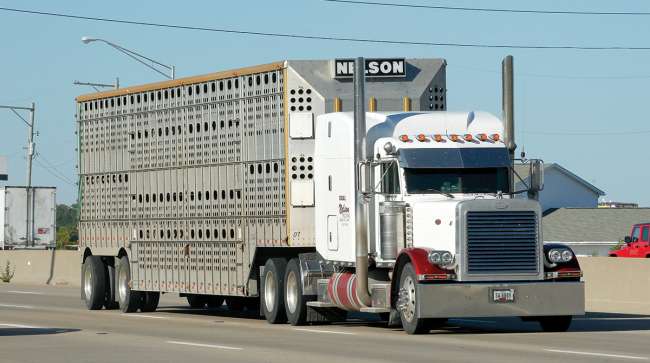Senior Reporter
Sen. Deb Fischer Again Introduces Livestock Hauling Bill

[Stay on top of transportation news: Get TTNews in your inbox.]
Legislation meant to enhance commercial operations for haulers of livestock and agricultural commodities was recently introduced in the U.S. Senate.
The Haulers of Agriculture and Livestock Safety (HAULS) Act, sponsored by Sen. Deb Fischer (R-Neb.), would seek to eliminate the requirement that agriculture and livestock hours-of-service exemptions apply only during state-designated planting and harvesting seasons.
Fischer, a senior member of the Commerce Committee, with jurisdiction over trucking policy, explained: “Nebraska’s ag and livestock haulers provide a critical service transporting food and fuel across the nation. However, certain federal regulations fail to account for the unique circumstances involved in moving their products.”

Fischer
“The HAULS Act builds on my previous work to help our haulers transport their critical goods safely and efficiently,” said Fischer on March 17. Co-sponsors include Sens. Jon Tester (D-Mont.), Roger Wicker (R-Miss.) and Tina Smith (D-Minn.), also members of the transportation committee.
Specifically, the measure also would amend the definition of “agricultural commodities” based on feedback provided by agriculture and livestock organizations. Additionally, the bill would authorize a 150 air-mile exemption from hours-of-service requirements on certain hauls of farm products and livestock.
The legislation was referred to a committee of jurisdiction for consideration. A hearing on the bill has yet to be announced. Fischer, backed by co-sponsors, had unveiled the measure last year. That bill, however, did not advance to the president’s desk for enactment before the congressional session ended.
HAULS Act by Transport Topics on Scribd
In a statement accompanying the legislation’s announcement, Zippy Duvall, president of the American Farm Bureau, said: “Farmers and ranchers must be able to get their crops and livestock to market efficiently and safely. The HAULS Act modernizes trucking regulations to meet the needs of our members. I applaud Sen. Fischer for her leadership on this important issue and look forward to working with her to get the HAULS Act enacted into law.”
In another statement, also accompanying the measure’s announcement, Mark McHargue, president of the Nebraska Farm Bureau, noted, “The efficient transport of livestock is critical to the agriculture sector and to the welfare of our livestock animals. Sen. Fischer has been a long-time champion of commonsense approaches to transportation rules and regulations.”
“The HAULS Act reflects this commonsense approach by updating oversight of livestock transport to provide flexibility and better reflect the unique challenges that exist in hauling live animals,” McHargue added.

Even before the pandemic, DHL's Larry S. Onge and Jim Monkmeyer set up strategies and implemented technology in order to respond to disruptions. Now, they know exactly how to get the vaccine from point A to point B — and, better, how to do it at a global scale. Hear a snippet, above, and get the full program by going to RoadSigns.TTNews.com.
Federal hours-of-service rules are used to regulate commercial drivers’ work time. Certain exemptions from the hours-of-service rules are in effect for hauling various agricultural commodities during planting and harvesting periods.
In November, the Federal Motor Carrier Safety Administration published an interim final rule that clarified certain definitions associated with agricultural goods. The interim final rule clarified terms “any agricultural commodity,” “nonprocessed food,” and “livestock.”
“Our nation’s farmers and agriculture haulers will benefit from this clarification of the rules and will be able to deliver their products in a safer and more efficient manner,” said then-FMCSA Deputy Administrator Wiley Deck. The U.S. Department of Transportation has indicated the agriculture industry contributes more than $1 trillion a year to the country’s economy.
Want more news? Listen to today's daily briefing below or go here for more info:

